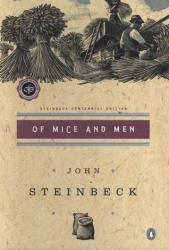
Of Mice and Men by John Steinbeck is a tale of grief and hope in the midst of the great depression. It begins with two men, George and Lennie, who are searching for work on a farm. George is witty and small while Lennie is mentally handicapped but enormous and physically strong. Both George and Lennie, as well as the other workers they meet, begin to represent the nation as a whole during the depression. Showing the struggles of every person in those horrible times. I think the novel is a sad story but it is a good representation of the personal and societal impacts of the depression and I think everybody should read it at least once.
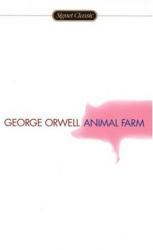
Animal Farm by George Orwell was published in 1945 16 years after Joseph Stalin came to power in the Soviet Union. The book chronicles the formation of the Soviet Union as well as major historical soviet events. The on twist, all Soviet leaders and classes of citizens are represented by farm animals! I love this book because the reader must infer who each animal represents. Once you have that figured out, there are many events in the book that can be tied to real-world events! I enjoyed this book a great deal and I would recommend it to anyone who has a desire to learn about Soviet history or enjoys books that make the reader piece together missing story elements.
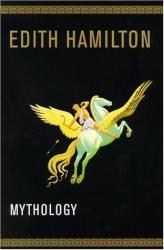
Edith Hamilton's collection of Greek and Roman stories covers the gods, creation, and earliest heroes; stories of love and adventure, the great heroes before the Trojan War, the heroes of the Trojan War, the great families of Mythology, the 'less important' myths, and the mythology of the Norsemen. There are over 100 Greek/Roman/Norse stories, and a family tree and glossary of all the gods and goddesses included. A bonus was the illustrations which were really detailed. I read this book because I wanted an introduction to the Greek gods and goddesses before reading the PercyJackson and Olympians series, and I think it's a great book to gain somefamiliarity with the mythological characters.
My favorite short stories were: The Underworld, Cupid and Psyche, Pyramus and Thisbe, Perseus, Theseus, Hercules, and Antigone.
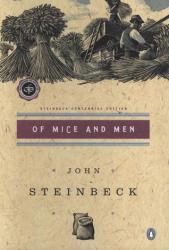
George and Lennie are two laborers searching for work in California. While George is small and quick, Lennie is a man of tremendous size and has the mind of a young child. Despite their differences, they have formed a "family", clinging to their dream of owning an acre of land and producing their own produce. When they find a job at a ranch in the Salinas Valley, fulfilling their dream seems to be within their grasp, but conflict arises when Lennie begins a flirtatious relationship with the ranch owner's wife, and even George can't protect him from that.
I liked this book! Lennie and George's relationship is heartwarming, and it shows that having close friends can make even the hardest life bearable. My favorite characters were Crooks and Lennie. Crooks, who lives by himself because he is the only black man on the ranch, shows how discrimination affects mental well-being. Like Lennie, Crooks has been outcasted and looked down upon by society for something he can't control, and I liked how Steinbeck brought two very different characters together by sharing their shared loneliness. George is a complicated character because, at the end of the book, he does what he believes is 'best for Lennie' but it begs the question of how far a friend should go if it's in 'your best interest'. I watched the movie as well, as it was also really good!
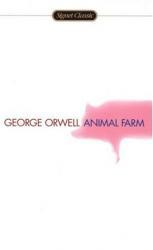
Animal Farm by George Orwell is a chilling tale of animals' uprising against humans to form an idyllic society. Without the rule of humans, animals expect equality, prosperity, and utopia. Over the course of this fable, however, the characters slowly devolve into new forms of oppression, greed, and violence against one another. Each chapter is more suspenseful than the last. The book is not entirely scary, but unsettling more than anything else. Orwell writes characters who are worth caring about, and antagonists that are easy to dislike.
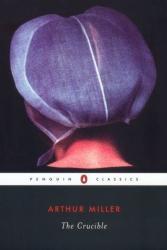
The Crucible is an allusion to the Salem Witch Trails of 1692. The main character, John Proctor, is a well-respected farmer in the small town of Salem, Massachusetts. When the first rumors that there are witches in Salem start stirring, Proctor pays little attention to them: he doesn't particularly believe in witchcraft and believes the townspeople are simply being hysterical. However, when his wife is accused of witchcraft, John has to put aside his personal feelings and find a way to save his wife and friends from hanging.
I hated the ending, but it made the play so much better. John develops significantly as a character. In the beginning, he only cared about protecting his reputation and hiding his affair, but in the final act, John became a martyr for the people of Salem. He's my favorite character in the play, and the movie is just as good!
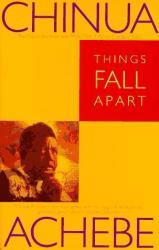
Things Fall Apart is about a Nigerian man, Okonkwo, who watches as his village is destroyed by European missionaries. Once a feared and respected man in his village of Umuofia, Okonkwo is reduced to eventually taking the orders of white men. Okonkwo is a hard and emotionless man who believes that anything that is not masculine is weak and therefore unworthy. When missionaries come to Umuofia, Okonkwo urges his fellow villagers to resist the attempts to diminish their culture and replace their government, but he's met with little support. Eventually, Okonkwo is banned, and when he returns, his village has completely changed.
I liked Things Fall Apart because it's a great book that challenged the idea of African savagery and portrays African culture, specifically Nigerian culture, as complex and intricate, and not the 'uncivilized' society many people view Africans as today. Okonkwo is an interesting character because his unwillingness to adapt to the new change represents an internal struggle many pre-colonized Africans faced in the wake of colonization. The ending is symbolic because it represents the ultimate death of culture as a result of European exploration.
Overall, the novel provides a beautiful insight into another culture often ignored in mainstream media.
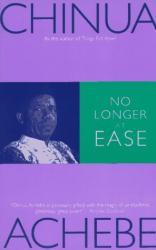
No Longer at Ease is the second installment in the African trilogy series. It is preceded by Things Fall Apart and follows the life of Obi, Okonkwo's grandson. Obi leaves his village in Nigeria to pursue an education in Britain where he meets Clara and falls in love with her. He returns to Nigeria and gets a job in civil service with the help of the board of elders. Obi is conflicted between his African culture and Western lifestyle, and heavy in debt, he takes a bribe.
Just like his grandfather, Obi is strong-minded and stubborn. He intends on marrying Clara although she is an osu, and begins taking bribes when he cannot pay his debts. He questions Nigerian traditions, and often compares Africa to Britain, ultimately positioning him in a place where he finds it nearly impossible to balance both cultures. However stubborn and sometimes reckless Obi is, he's a symbol of generational growth: unlike his grandfather and father, Obi ultimately understood that one culture was not better than the other, and change was imminent. Okonkwo, Nwoye, and Obi symbolize the different industrial stages of Nigeria and the social turmoil that followed, and they show the theme of western versus eastern culture clashes.
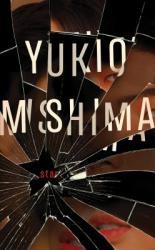
Rikio is a star and he likes the glamor, money and notoriety that comes with that lifestyle. His ears ring with the cheers, screams and exhortations of fans, mostly young women, who would kill for a moment with him. But it also means constant scrutiny, which has the 23-year-old celebrity struggling with his own anxieties and obsessions. What if those fans stop desiring him someday? The self-loathing star would rather be in character on a movie set than be himself.
Written shortly after starring in his first film, the late Yukio Mishima delivers a blunt, rich portrayal of a flawed young man lost between his public persona and private life. The novella, first published in 1961 and translated into English for the first time in 2019, is even more relevant now in today's 24/7 media landscape. Awards: Japan-U.S. Friendship Commission Prize for the Translation of Japanese Literature
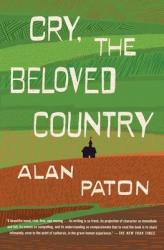
Cry, the beloved country
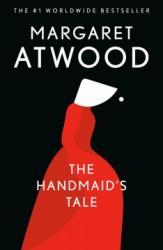
This novel followes the life of "Offred" who is part of the first wave of women during the Gilead regime. "Offred", whose real name is never revealed in the book, is a Handmaid whose sole responsiblity is to have children to sustain the rapidly declining Caucasion population. She tries to accept her life as a Handmaid, but is haunted by memories of the time before Gilead when she had a family and was free from the oppressive society she currently lives in.
I really liked how Atwood discloses minimal details about "Offred" which makes it clear that what is happening to her can happen to any woman. The novel is set in a utopian society, and it's very interesting to read the rationale behind the establishment of the Gilead regime and how sexism and anti-feminist retoric is a constantly looming problem in society. The novel is told through "Offred's" perspective, and personally, I felt she was a bland character, but her story itself was interesting. The book hangs off on a cliffhanger, and I'm definitely going to read the sequel and watch the Hulu adaption after!
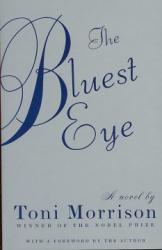
The Bluest Eye is about a young African-American girl named Pecola living in 1940's Ohio. Pecola lives with her brother and abusive parents who constantly tell her she is ugly because of her dark skin and kinky hair. On top of that, the children at her school bully her for the fact that her father is an alcoholic. All her life, Pecola has wanted blue eyes to feel pretty. Her only friends, Freida and Claudia try to defend her against the colorism in their community, but Pecola is unable to embrace her features and becomes obsessive over her desire for blue eyes.
One of the reasons I read this book is because of Morrison's writing style and her thematic elements. The book is very intellectually stimulating and gave me better insight into colorism and how it is still largely prevalent today in the African-American community. I really liked how Morrison used a young girl as a main character to show how these feelings of low-esteem and poor body image are started at a young age, and how the people around us influence our thoughts and feelings.
There are a lot of complex characters and you get to hear each of their stories about why they're the way they are. Claudia is my favorite character because she represents women and girls who challenge our ideas of beauty. The ending was sad, but it really brought light to how damaging our obsession with beauty is.
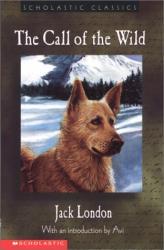
I was required to read The Call of the Wild for my Literature class. The story is about a lovable St. Bernard dog named Buck. At the start of the story, Buck lives in the cushy and comfy house of Judge Miller, but eventually winds up in the wild North of the Yukon. Serving as a sled dog, Buck passes through many owners, good and bad, and learns to answer the Call of the Wild. Overall, it was a pretty good book, but I would only give it Three Star review for these reasons:
1: As it is a classic, the book was written with an older style of English, which can be a little hard to understand. Older English can also take away some of the gravity in pressing situations.
2: There wasn’t quite as much action as I would have liked.
3: I enjoyed the book, but some of the action scenes may have been ruined by the Older English, although the Older English gives the reader a taste of how people communicated in the past. However, the characters, plot, and setting were developed well, so overall, Call of the Wild is a classic, and a quality work of literature, which still can be enjoyed today.
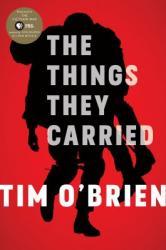
The Things They Carried is a memoir by Tim O'Brien about his experiences as an American soldier fighting in the Vietnam War. O'Brien was chosen to be drafted in 1968. This incident was extremely stressful for O'Brien who had taken a stand against the war, yet didn't want to disappoint his community. He pondered running away to Canada, but eventually decided to fight. The Things They Carried is a series of stories that are so well written. The work is a bit hard to understand just because O'Brien wrote it in a way that is not completely nonfiction. In the book, he explains this concept more in depth. Overall, I thought this book was a very well written, interesting, and educational story regarding the horrors of war from O'Brien's perspective in Vietnam.
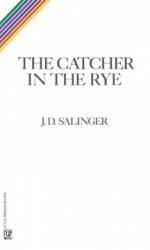
The Catcher In The Rye is about the life of Holden Caulfield and his views on the world as well as life. Holden drops out of a prep school in Pennsylvania to explore New York City. This book captures living in the 1950's and 1960's brilliantly, as well, as the spirit of rebellion that Holden has. I did not like this book because Holden complains way too much and has negative views on the world around him. He also has a bad habit of using profane language in every sentence. The message of the book however is meaningful as it discuses how kids should enjoy being themselves and to stop worrying about growing up and becoming an adult so fast.
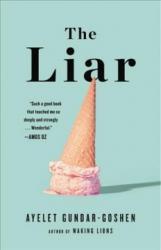
"Oh what a tangled web we weave/When first we practice to deceive’". This novel covers a life changing event of a 17 year old girl, Nofar, who has lived an average life and is about to enter her senior year of high school. During the summer, she works in an ice cream shop. One afternoon, she has unpleasant encounter with a formerly famous singer, and tells a lie that escalates events in both of their lives. Her life changes in an exciting and scary way, and his for the worse. As things progress, Nofar repeatedly considers the consequences of her words, which have a domino effect as her lie not only impacts her, but many around her as they get pulled into her dishonesty.
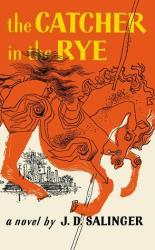
This book is about a boy named Holden's life. Holden has decided to run away from school after he was suspended. He had to figure out life because he didn’t want his parents knowing. I didn’t like this book because I found it wasn’t very interesting. The reason being is it’s not very adventurous and keeps repeating negativity throughout the book.
(Reviewer Grade. 9)
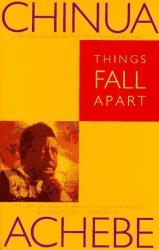
“Things Fall Apart” follows Okonkwo as he becomes a very successful man with many yams, several wives, and political power in Umuofia. The whole first part of the book focuses on his characterizing Okonkwo and showing what tribal culture was like. The author uses subtle references to Europeans to set up the main conflict of the book, European culture. Before the Europeans reach Umofia, Okonkwo accidentally kills a clansmen and is exiled. For the period of his exile, Okonkwo watches from the outside as his own village is changed radically by Christian missionaries.
Overall, I think this book is worth a read for the powerful theme, it wasn’t something I would want to read again because so much of the book was just about life in Umuofia, which was a bit mundane. Onkonkwo was also a pretty static character, there was no character development either. He just wanted to be the opposite of his father, was very strict, harsh, and closeminded. I did like the metaphors and proverbs in the book. I remember a metaphor that stood out in particular was, “Living Fire begets cold,
impotent ash.” I also enjoyed the later portion of the book where the Europeans missionaries arrive and the Onkonkwo provides a different perspective on the situation, and the theme is more clearly defined and developed.
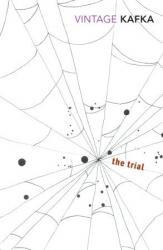
The Trial is a brilliant novel. Throughout the story the reader follows K., the protagonist, who tries to figure out what he was arrested and charged for. On his journey, K. meets several different types of people all which contribute to the book's questioning of bureaucracy and totalitarianism. Its finale left me a bewildered state, probing at the depths of existence and reality. Whether or not this feeling was a good one, I cannot tell, however Kafka's ability to use the mysteries of existentialism and expand upon them is truly amazing. I highly recommend this novel.
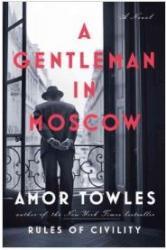
A Bolshevik tribunal puts Count Alexander Rostov under lifelong house arrest at The Hotel Metropol, a real luxury establishment located near the Kremlin, at the start of the Soviet Union. This man, who has never worked a day in his life, uses his considerable charm to carve out an existence while bearing witness to some very tumultuous decades. The people he meets, loves and opposes over the next 30 years help the nobleman determine a purpose in life under reduced circumstances. His evolution over the decades and his charm make the Count, who could have been insufferable in a different situation, someone many would befriend. This beautifully written second novel by the author of The Rules of Civility provides an interesting perspective on Soviet history, what it means to be a family and the reasons why to keep on living, even in a gilded prison.


